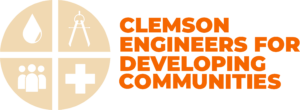Those living in developing countries often do not have a proper way to dispose and treat human waste, leading to rampant spread of diseases such as cholera. In Haiti, most people openly defecate or use pit latrines. Because of this, fecal matter contaminates the water supply. Biodigesters provide a way to sustainably treat waste and prevent disease. They retain and break down solid waste through anaerobic digestion and then release methane and a nutrient-rich effluent.
In 2013, CEDC installed a biodigester in Cange, Haiti that is located behind the external clinic at the Zanmi Lasante compound. This biodigester consists of a series of three reactor bags which lead to a subsurface flow wetland. Waste comes from latrines either next to the system or at a nearby school. Black water from these latrines runs directly into the biodigester while the grey water runs into the wetland to reduce the amount of liquid in the digester. The digestion process releases methane which can be used as a substitute for charcoal. Methane burns much more cleanly and can alleviate respiratory issues, would be cheaper, and reduces the need to cut down trees. The demand for charcoal has caused major deforestation in Haiti. Because the biodigester requires no input energy but produces methane which can be used for energy, it is considered a net-positive system.
